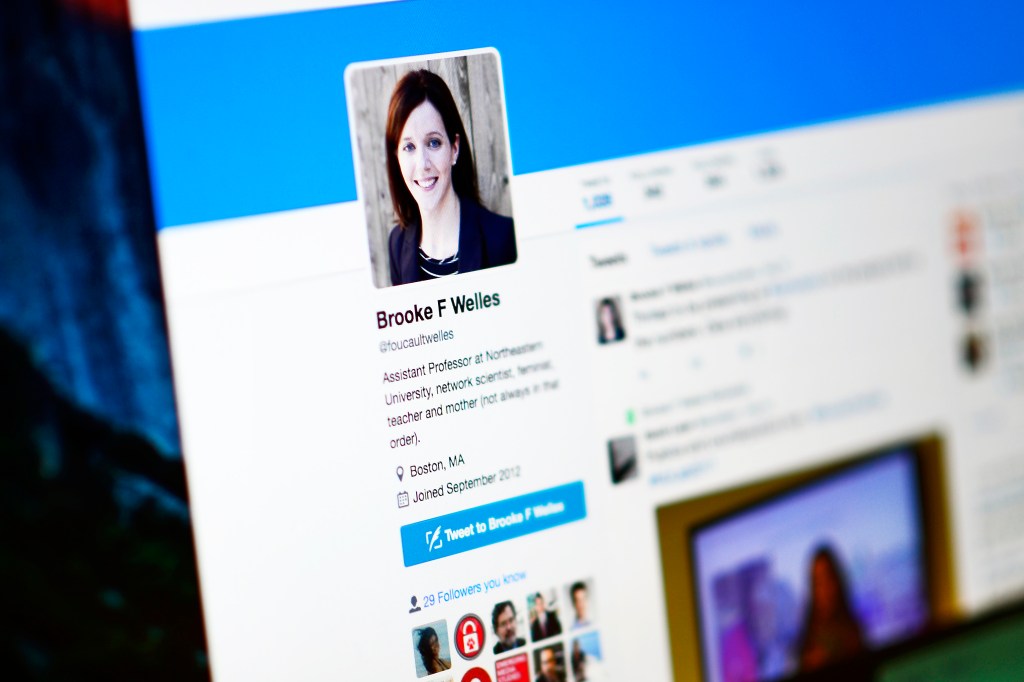Social media spotlight: Brooke Foucault Welles

Brooke Foucault Welles’ Twitter use is deeply tied to her research. Welles, assistant professor of communication studies, examines how social networks shape and constrain human behavior. One area of particular focus is social media activism and online activism networks.
We asked Welles about how she approaches using Twitter for her research and teaching, what lessons she’s learned along the way, and what advice she would give colleagues interested in using Twitter professionally for the first time. She also recalls that time Michelle Obama tweeted at her.
Your research ties in very closely with social media. How do you approach using this platform for scholarship and teaching?
I think there are a few different ways I use Twitter. One is that the vast amount of data I’ve used lately in my own research is from Twitter. My work involves online activism research. I collect data there and follow people and activism hashtags, such as #Ferguson. I also think it’s important from an ethical standpoint and epistemological standpoint to be a participant as I’m studying a topic. Additionally, I’m aware that students and colleagues follow me on Twitter, and I make a concerted effort to talk about motherhood and balancing being a mom with my work in academia. I’ll post something sarcastic or funny like, say, about grading papers while my child is sick. I think it’s important to humanize those situations for others to see.
What are some important lessons you’ve learned, or ways in which your social media use has evolved?
With Twitter in particular, I’ve had an interesting progression. When I first started, it was to broadcast about my new articles or follow people in my field. But I came to realize it was a place to also make human connections. Over time I’ve learned to occasionally take a step back, and if someone tweets a message of distress, for example, to just respond in kind and acknowledge what you’re experiencing. This can happen both in a more public way, like connecting with people being harassed during the #GamerGate situation. And it can also mean connecting with students, who might occasionally tweet saying they’re feeling stressed out about something. It’s lightweight mentoring, and I’ve had some really lovely interactions from doing that.
You mentioned your work involves studying social media activism. What trends are evolving in this space?
Hashtag activism has been around for several years, and one of the things we’ve noticed is a convergence on strategy. People have gotten better at getting messages out. It shows great promise for the platform, to make things trend and get interest from mass media. We also saw a subversion of the mainstream media on Twitter during the presidential election. It was the go-to platform for President Trump. That’s thrown an interesting twist on things. Our argument leading up to the election was that Twitter was an unconventional platform to raise awareness from mainstream media. Now we’re seeing a “Twitter-first” strategy. Everyone knows that Twitter matters now.
What advice would you give colleagues interested in starting to use Twitter professionally?
One of the risks of Twitter is that it can sometimes feel like shouting out a window if you don’t have a network formed. Attaching your debut on Twitter to your attending a conference can be a way to get a network of feedback going and feel out the boundaries of social and professional tweets. I’d also say don’t be shy about posting good news about your career when you get a grant or publication. People do pay attention.
Have you had any “wow” moments from Twitter, where a public figure has connected with you or one of your tweets went viral?
I don’t have any massive retweet storms to share. But Michelle Obama once answered a question of mine. It was a Twitter Q&A a few years ago about children, technology, and being active. She responded to my question about tips for managing screen time when your kids are off of school during the summer. She had a lovely response. She said don’t be afraid of a little screen time, but summer is a great time to get outdoors.
Do any celebrities follow you, or is there someone in particular who you’d get a kick out of if they followed or tweeted at you?
Taye Diggs followed me. Apparently that’s his thing, to follow academic feminists. I got a kick out of that. He followed me during last Memorial Day weekend. I remember because I was camping, and saw he was following me and said, “Wait, that can’t be real.” I clicked on it because I assumed it wasn’t real. But it was him.





